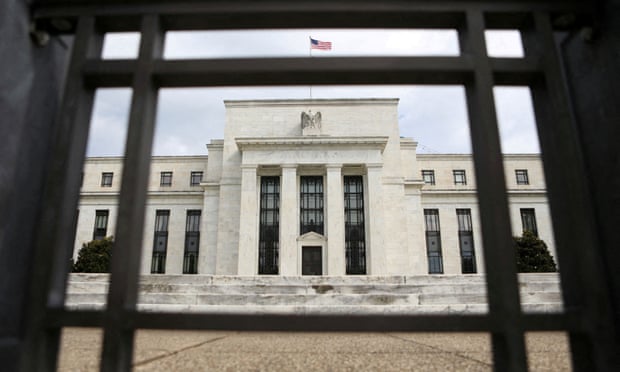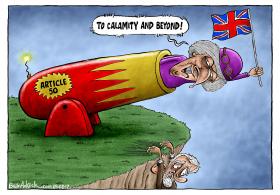Phillip Inman in The Guardian
As the Fed raises interest rates, dollar-denominated loans become an unsustainable burden to states around the globe
 The Federal Reserve is planning a second interest rate rise in a year this month. Photograph: Chris Wattie/Reuters
The Federal Reserve is planning a second interest rate rise in a year this month. Photograph: Chris Wattie/Reuters
Later in July US interest rates are expected to jump for a second time this year, and that’s going to wreck any chance of a global recovery.
The Federal Reserve could push its base rate up by as much as a full percentage point, ending 15 years of ultra-cheap money, intended to promote growth.
This jump, to a range of 2.5%-2.75%, would take the cost of borrowing money in the US to more than double the Bank of England’s 1.25%. And yet the Fed could just be taking a breather as it contemplates even higher rates.
This column, though, is not about the US. It is concerned with the terrible impact on Britain and countries across the world of America’s selfish disregard when it decides to tackle high inflation with higher borrowing costs. Britain is already feeling the effects of the Fed’s pledge to tackle inflation until it is “defeated”, come what may.
Higher interest rates in the US make it a more attractive place for investors to store their money. To take full advantage, investors must sell their own currency and buy dollars, sending the price of dollars rocketing higher.
In July the US dollar increased in value against a basket of six major currencies to a 20-year high. The euro has slipped below parity with the dollar in the last few days. The pound, which has plunged by more than 10% this year to below $1.20, is losing value with every week that passes.
In Japan, the central bank has come under huge pressure to act after the yen tumbled to its lowest level against the dollar since 1998.
There are two important knock-on effects for those of us that live and work outside the US.
The first is that goods and raw material priced in dollars are much more expensive. And most commodities are priced in dollars, including oil.
Borrowing in dollars also becomes more expensive. And while getting a loan from a US bank is beyond the average British household, companies do it all the time, and especially those in emerging economies, where funds in their backyard can be in short supply.
The Bank of England interest-rate setter Catherine Mann recently said that her main motivation for wanting significant increases in the UK’s lending rates was her fear that the widening gap with the dollar was pushing up import prices. And higher import prices meant higher inflation.
If only she could persuade her colleagues on the Bank’s monetary policy committee that the devaluation of the pound was a serious issue, maybe they would push up the Bank’s base rate in line with the Fed rate increases. After the Fed makes its move, more may join her.
Until January this year, Britain’s inflation surge was on course to be short-lived. Now it seems the Russian invasion of Ukraine and a splurge of untargeted handouts by the Biden administration during the pandemic, which have served to push up prices in America, will keep inflation in the UK high into next year.
Those governments that have borrowed in dollars face a double whammy. Not only will they need to raise domestic interest rates to limit the impact of import price rises, they will also face a massive jump in interest payments on their dollar borrowings.
Emerging markets and many developing-world countries will be broke when these extra costs are combined with a loss of tourism from the Covid pandemic. Sri Lanka has already gone bust and many more could follow.
For the past three decades, western banks have marketed low-cost loans across the developing world as a route to financial freedom.
Zambia’s government borrowed heavily before the pandemic to become self-sufficient in electricity. It is a laudable aim, but has left the central African state with a ratio of debt to national income (GDP) much the same as France’s – about 110%.
The problem for Zambia is not the same as for France, which pays an interest rate of 1.8% to finance its debts, measured by the yield on its 10-year bonds. The Zambian 10-year bond commands a rate of 27%. Now Zambia, like France and so many other countries, must borrow simply to live. To invest is to borrow more.
There is no sign that the US will change course. Joe Biden is in a panic about the midterm elections, when fears of spiralling inflation could favour the Republicans. This panic has spilled over to the Fed, which has adopted hysterical language to persuade consumers and businesses that higher rates are coming down the track and to curb their spending accordingly.
The Fed knows inflation is a problem born of insufficient supply that only governments can tackle. But that doesn’t look like stopping it from pushing the US economy, and everyone else’s, into recession.
As the Fed raises interest rates, dollar-denominated loans become an unsustainable burden to states around the globe
 The Federal Reserve is planning a second interest rate rise in a year this month. Photograph: Chris Wattie/Reuters
The Federal Reserve is planning a second interest rate rise in a year this month. Photograph: Chris Wattie/Reuters Later in July US interest rates are expected to jump for a second time this year, and that’s going to wreck any chance of a global recovery.
The Federal Reserve could push its base rate up by as much as a full percentage point, ending 15 years of ultra-cheap money, intended to promote growth.
This jump, to a range of 2.5%-2.75%, would take the cost of borrowing money in the US to more than double the Bank of England’s 1.25%. And yet the Fed could just be taking a breather as it contemplates even higher rates.
This column, though, is not about the US. It is concerned with the terrible impact on Britain and countries across the world of America’s selfish disregard when it decides to tackle high inflation with higher borrowing costs. Britain is already feeling the effects of the Fed’s pledge to tackle inflation until it is “defeated”, come what may.
Higher interest rates in the US make it a more attractive place for investors to store their money. To take full advantage, investors must sell their own currency and buy dollars, sending the price of dollars rocketing higher.
In July the US dollar increased in value against a basket of six major currencies to a 20-year high. The euro has slipped below parity with the dollar in the last few days. The pound, which has plunged by more than 10% this year to below $1.20, is losing value with every week that passes.
In Japan, the central bank has come under huge pressure to act after the yen tumbled to its lowest level against the dollar since 1998.
There are two important knock-on effects for those of us that live and work outside the US.
The first is that goods and raw material priced in dollars are much more expensive. And most commodities are priced in dollars, including oil.
Borrowing in dollars also becomes more expensive. And while getting a loan from a US bank is beyond the average British household, companies do it all the time, and especially those in emerging economies, where funds in their backyard can be in short supply.
The Bank of England interest-rate setter Catherine Mann recently said that her main motivation for wanting significant increases in the UK’s lending rates was her fear that the widening gap with the dollar was pushing up import prices. And higher import prices meant higher inflation.
If only she could persuade her colleagues on the Bank’s monetary policy committee that the devaluation of the pound was a serious issue, maybe they would push up the Bank’s base rate in line with the Fed rate increases. After the Fed makes its move, more may join her.
Until January this year, Britain’s inflation surge was on course to be short-lived. Now it seems the Russian invasion of Ukraine and a splurge of untargeted handouts by the Biden administration during the pandemic, which have served to push up prices in America, will keep inflation in the UK high into next year.
Those governments that have borrowed in dollars face a double whammy. Not only will they need to raise domestic interest rates to limit the impact of import price rises, they will also face a massive jump in interest payments on their dollar borrowings.
Emerging markets and many developing-world countries will be broke when these extra costs are combined with a loss of tourism from the Covid pandemic. Sri Lanka has already gone bust and many more could follow.
For the past three decades, western banks have marketed low-cost loans across the developing world as a route to financial freedom.
Zambia’s government borrowed heavily before the pandemic to become self-sufficient in electricity. It is a laudable aim, but has left the central African state with a ratio of debt to national income (GDP) much the same as France’s – about 110%.
The problem for Zambia is not the same as for France, which pays an interest rate of 1.8% to finance its debts, measured by the yield on its 10-year bonds. The Zambian 10-year bond commands a rate of 27%. Now Zambia, like France and so many other countries, must borrow simply to live. To invest is to borrow more.
There is no sign that the US will change course. Joe Biden is in a panic about the midterm elections, when fears of spiralling inflation could favour the Republicans. This panic has spilled over to the Fed, which has adopted hysterical language to persuade consumers and businesses that higher rates are coming down the track and to curb their spending accordingly.
The Fed knows inflation is a problem born of insufficient supply that only governments can tackle. But that doesn’t look like stopping it from pushing the US economy, and everyone else’s, into recession.

